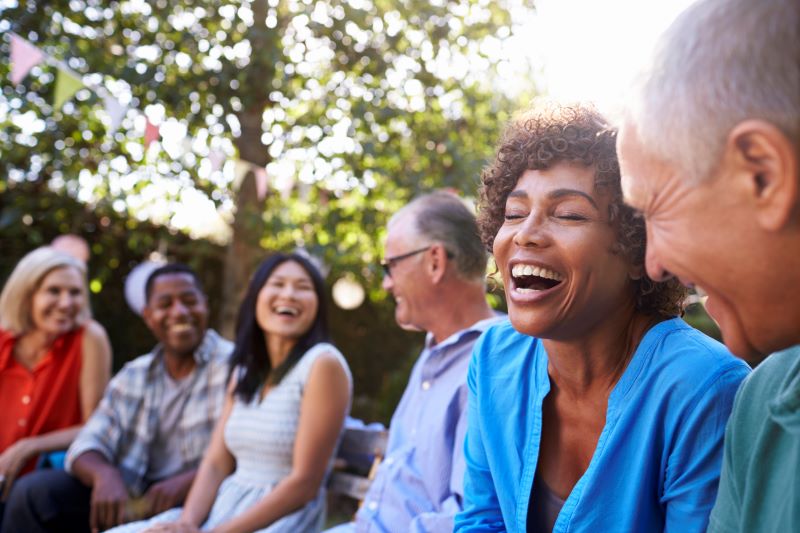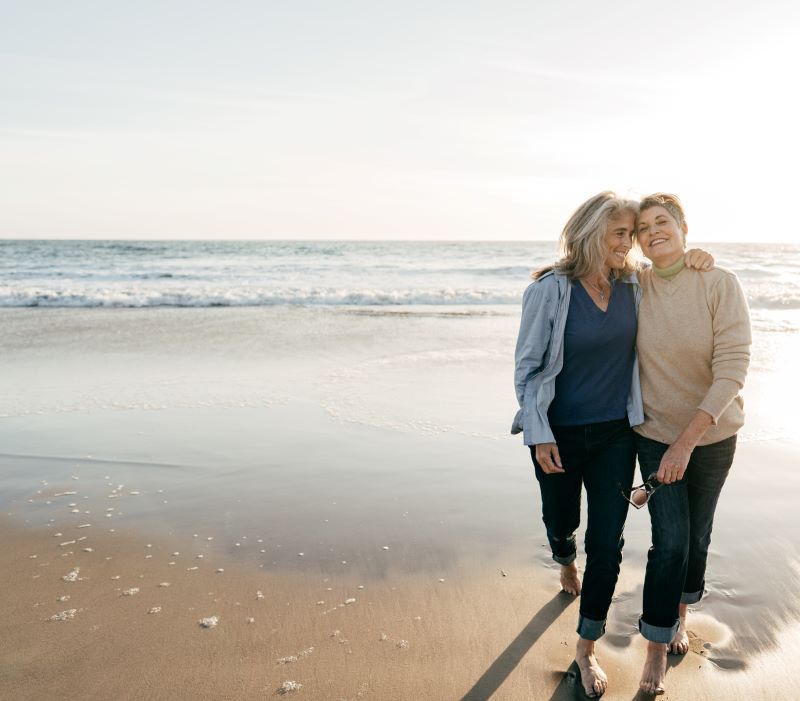Friendship is important for happiness, but did you know it may also help keep your brain sharp, your body healthy and your mind well as you age?
Just like playing chess, doing brain teasers or learning a new language, interacting with friends can exercise your brain. Research shows that social connection lowers your risk of dementia, and participation in social activities is linked to slower cognitive decline over time.
Not to mention, social connectedness has been proven to improve wellbeing and mental health.
Read on to learn how relationships can help keep your mind, body and spirit healthy, plus tips on how to make new friends and strengthen existing bonds.
The Surprising Impacts of Loneliness
Social connection can help combat loneliness, which was a growing issue in the U.S. even before the pandemic led to increased social distancing. In May 2023, the U.S. Surgeon General issued an advisory on loneliness and isolation, highlighting the prevalence of social disconnection.
U.S. Surgeon General Dr. Vivek Murthy described this loneliness as an epidemic that has harmed individual and societal health. Lack of social connection is a bigger risk to health than smoking 15 cigarettes a day, drinking six alcoholic beverages a day, or not exercising, according to the advisory.
Social disconnection is also linked to an increased risk of heart disease, stroke and dementia for older adults.
In fact, a study in the “Journal of Geriatric Psychiatry” that followed a group of older adults for 10 years found cognitive abilities declined 20 percent faster in adults experiencing loneliness.
The good news is that friendships and relationships can help combat loneliness and reduce these risks.
Focusing on friendships can increase your sense of belonging and reduce loneliness and its negative effects on your mind and body, says John Lee, Ph.D., a licensed clinical psychologist with Executive Mental Health. “Strong social connections can be powerfully protective and beneficial as you progress through your lifespan,” he says.
Make New Friends and Keep The Old
Do you wish you had more friends or deeper connections? Here are six ways to make new friends, keep existing ones and prioritize friendship in midlife and beyond.
1
Be willing to take initiative.
Have a friend you just never find time to see? Make the effort to reach out and extend an invitation for dinner, coffee or a walk. Taking initiative involves risk, but it helps to think of extending social invitations like baseball, Lee says. “Hall of Famers are successful if they can get a hit one out of three times,” he says. So, if you ask three people to get together and two say no, you’ve still “won” by connecting with a friend.
2
Check off bucket list items.
Have you always wanted to learn to dance tango, research your family roots, parachute out of a plane or go whale watching? Shared interests are one of the best ways to spark new friendships: They offer ready-made conversation starters and a way to connect around passions. So dust off your bucket list and tackle some of those items with social connection in mind, says Darnell Cox, a healthy aging coach and gerontologist. “Take one of those ‘I’ve always wanted to’ things and make it a reality by Googling, ‘Where can I take a knitting class?’ ” and then signing up, Cox says.
3
Make more casual social connections.
When you think of friendship, you may think of a ride-or-die lifelong pal. But casual social connections can also boost your mood and put you in contact with a pool of people who have the potential to become closer friends. So, find your “third place“—a place you regularly spend time outside home or work. That could be a gym, a coffee shop, the library or a yoga studio, Cox says. For example, she joined a gym down the street from her house found that other regulars in the same exercise classes greeted her by name within a couple weeks. “Imagine the dopamine receptors that get signaled just by walking into a class where other human beings know you,” she says. “And you never know when those casual relationships may transform into deeper, more meaningful ones.”
4
Take on a new role.
When Phoenix resident Diana Mansell joined a senior center within walking distance of her home, she started going to its studio to practice silversmithing. She made rings and pendants, then eventually volunteered to be a studio monitor and the board treasurer. In her new roles, other members of the studio started reaching out to her for help, whether they need to find a tool, learn how to use equipment safely or get reimbursed. When you get more involved in an organization or group, “you’re definitely in the spotlight,” Mansell says. That can lead to deeper connections and friendships. “If you look at what help is needed, and contribute where you can, that’s what makes a community work,” Mansell says.
5
Rekindle old friendships.
Chances are, you’ve got at least one friend you’ve drifted away from due to a job change, a move or a busy season of life. Reaching out to reconnect can feel awkward, but it can pay off. My husband, for example, recently reconnected with two college friends he’d fallen out of touch with after moving across the country for work. “At first, I was really apprehensive,” he says. But the three bonded over a love of films, attended a horror film festival together and now meet every other week for a virtual film club. Reaching out to an old friend can be worth the risk, Lee says: “If you don’t, the end result is missing out on that potential social connection.”
6
Deepen existing friendships.
If you already have one or more people in your life that you consider close friends, make it a point to strengthen these friendships. One way to do this: Practice active listening. This includes paying close attention, showing interest with eye contact, nodding and verbal cues, then summarizing what the other person said. Active listening can help you engage more deeply in a conversation, which helps the other person feel seen and heard.
Sharing your thoughts and feelings with a trusted friend can strengthen relationships, too; research shows confiding in others may help prevent depression. “It’s important to have relationships where you can share feelings and feel validated,” Lee says.
Start with just one or two of these tips to create more connection and give your friendships a boost. Branch out from there as your circle grows, and notice the impacts on your mental and physical well-being.
How do you prioritize connection in your life? Leave a comment to share your own tips for making new friends or maintaining old relationships.







Combatting loneliness was enlightening to me.Thank You.I do think I put myself sometimes in personal isolation,with I know is not healthy for my mental wellness.
Be willing to attend an event even if maybe it’s not your first choice. I Just went to Micro Wrestling when he suggested it and we had a great time.
Thank you for this message. I am 93 living alone but have many caring friends and I know these friends have kept me alert and happy especially since the loss of my husband bit this message has confirmed my thoughts so thank you.
For some of us there are extra challenges to finding friends. Having never learned to make friends in childhood these situations are already difficult. Being low income and dealing with multiple health issues can make it extra difficult. I can’t walk anywhere to get together with people and anything that costs even a small amount is out as an option. Often the fear of stigma because of health or poverty or the embarrassment in saying I can’t participate in some things because I can’t afford it will keep me from joining groups. Some health issues make it difficult to focus and research what possibilities there may be in one’s community with the end result that you end up just staying home withno idea where you might go.
This information was extremely helpful. Thank you for posting.